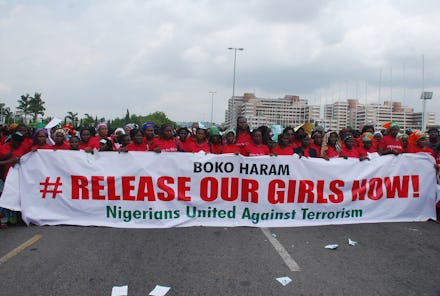The 300 Missing Nigerian Schoolgirls Have Been Found

The news: Six weeks after hundreds of Nigerian schoolgirls were kidnapped by the terrorist group Boko Haram, authorities may finally know where the girls are being held.
Nigeria's chief of defense staff Alex Badeh revealed Monday the government knows the girls' whereabouts — but could not reveal their location or use force to rescue them right now.
"The good news for the parents of the girls is that we know where they are, but we cannot tell you," Badeh was quoted telling a group of visitors at his office in the capital of Abuja. "Just leave us alone — we are working to get the girls back."
The Pentagon, which has been assisting the surveillance operation with drones, could not confirm the announcement — but even if the Nigerian government is aware of the girls' location, there is still a long way to go before the girls can be safely returned home.
Why is it so hard to bring the girls home? As Badeh said, determining the girls' whereabouts is "good news for the parents of the girls," but there are still many other factors in play. Boko Haram is a notoriously brutal organization, and it has shown in the past that it's not afraid to kill innocent children. One wrong move by the Nigerian authorities could seriously endanger the girls' lives.
"We want our girls back. I can tell you that our military can and will do it, but where they are held, can we go there with force?" Badeh said. "Nobody should say Nigerian military does not know what it is doing. We can't kill our girls in the name of trying to get them back."
Though that might seem like a defensive response to the international criticism of the Nigerian government's handling of this operation, Badeh has a point. And while military intelligence is certainly useful, diplomacy may still be the safest option at this point.
What is happening on the diplomatic end? It's important to keep in mind that, for now, it's in Boko Haram's best interests to keep the girls safe. The girls are a crucial bargaining chip for the terrorists: The Nigerian military has stopped bombarding their hideout in fear of hurting the girls, and they have leverage to negotiate the release of their brethren.
An agreement to release 50 of the kidnapped girls in exchange for 100 Boko Haram prisoners was almost reached before Nigerian President Goodluck Jonathan reportedly decided to pull out. He undoubtedly felt that negotiating with terrorists is a slippery slope. But going to their hideout with guns blazing probably isn't the right option either.